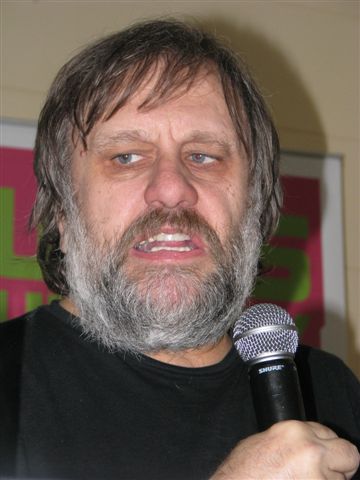Political Minutes: Slavoj Zizek
If you’re not familiar with Slavoj Zizek, the prophetic philosopher and cultural theorist from Slovenia, the first thing you should know about him is that he has opinion on just about everything. When listening to him speak, you are guaranteed to fully comprehend less than 50 percent of everything he says, be thoroughly annoyed by his fidgeting, and yet still, ultimately, manage to be absolutely blown away. Tuesday night’s panel featuring Slavoj Zizek alongside Columbia’s own Stathis Gourgouris, Lydia Liu, and Bruce Robbins was no exception.
In his introduction Stathis Gourgouris, Professor of Comparative Literature, commented that Zizek produces thought and writings at a “super human speed and scale.” Although the official topic of the panel was discussion of Zizek’s newest book The Year of Dreaming Dangerously, in which Zizek argues that the“events of 2011 augur a new political reality,” Zizek structured his presentation around five “short interventions.” Demonstrating an incredible propensity for analysis of our current unique existence as a globalized world, Zizek left the audience with several troubling thoughts, claiming ultimately “our times are a time of un-doing” requiring us to reimagine the political sphere as it is and as it could be. Zizek predicts “a divorce on the horizon between capitalism and democracy” and argues that, as our political landscape begins to change, we must think more radically and ask more radical questions if we are to emerge from our current state of political upheaval. Despite the heavy nature of the discussion, Zizek managed to keep a light tone throughout, even ending his presentation with the declaration, “Now I exposed myself like Jesus Christ”.
Although he takes a radical, Marxist approach, Zizek’s conjectures still contained grains of truth that could be appreciated by everyone regardless of political background. Furthermore, in representing ideas of extreme radicalism, Zizek forces us all to bring into question our own political ideals and, most importantly, to defend them. This idea was made evident by the panel portion that followed Zizek’s initial presentation. In this section of the evening Robbins, Liu, and Gourgouris each offered critiques of Zizek’s arguments, which were followed by a final rebuttal by Zizek.
Engaging, entertaining, and witty, Zizek was undeniably the star of the panel. Initially, I doubted the sense in even bringing in additional panelist\s, but hearing Zizek’s response to the critiques of Gourgouris, Liu, and Robbins completely changed my opinion. Zizek was completely invigorated by the opportunity to debate. He thoughtfully rebuked criticisms with well-crafted answers that tended to contain a few more curse words than his prepared portion, much to the audiences’ delight. During the question and answer portion, Zizek even promised a particularly discontented attendee the opportunity to debate him on the merits of communism when he returns to New York in April. I personally am looking forward to the event but fear slightly for this man – if there was one lesson to be learned from Tuesday night’s panel it is that, if you debate Zizek, you will lose. The impassioned manner in which Zizek debates reminds us that this is what politics is supposed to be: real debate, real radicalism, and real ideas.



